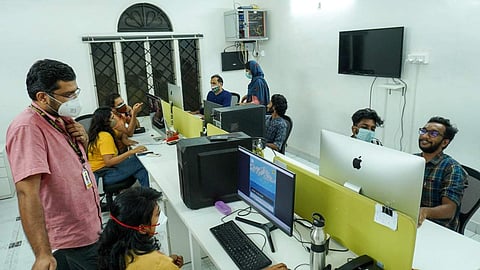

Since the pandemic, EdTech start-ups have become a dime a dozen, each having to offer something different to stand out from the crowd. For Outclass, an EdTech platform in Kerala, it was about catering to the Kerala State Board syllabus through learning material they have developed exclusively for students who learn in the vernacular language of Malayalam. Outclass has been creating waves with its creative advertisements that stand out for their sensible content without requiring any eminent celebrities to back them up. The ads quite simply talk of pertinent social issues in pertinent settings. We caught up with Tuhin Menon, the CEO at Outclass, to talk about the start-up and the journey so far. Excerpts:
1. We'll talk about Outclass but first, you've got to tell me about the idea behind these advertisements that have gone viral.
The ads really stem from our core philosophy of reaching out to a huge cross-section of students who have taken the Kerala State Board medium of education. We wanted our ad to reflect our vision of a holistic and inclusive form of education. We are striving to create content that is outcome driven at the same time. We have taken the approach of setting our base among the everyday people. The ad that we did to demystify women's menstrual hygiene was symbolic of several societal myths that continue to perpetuate despite the lack of any scientific basis. I feel the people have also become cynical of the same type of ads that exist for EdTech platforms. They want to see something relatable and that is exactly what we wanted to portray in our ad campaign.
2. What does Outclass provide as a service to students?
Outclass was started a little over a year ago with the core vision of producing high quality educational content for vernacular language audiences. We launched in Kerala last year and the majority of content that we developed was for students learning in Kerala State Board syllabus from Classes I to XII. We also have three co-curricular offerings, one for early learning, which is for Classes I to IV, then to teach coding in Malayalam language for Classes V and above and finally, to teach Carnatic music to students.
3. What led you down this path of creating content in Malayalam?
What we were witnessing during the pandemic last year was that there came a surge in adoption of EdTech platforms. Among them, the large national-level ventures largely focused on the CBSE, ICSE and International Board students. There was a great demand for EdTech companies to step into the vernacular language market space. Especially in Kerala, there was a great requirement because the State Board syllabus is deeply rooted in Malayalam. That's where we saw a huge need gap because it had been completely ignored in this phase of 'EdTech revolution'.
From market research as well as anecdotal evidence, we learnt that the emphasis placed on education in Kerala remains very high. The gap that we identified here was that infrastructure in government schools is not great, despite the laudable efforts of the state government. Even though the absolute number of students is much higher in states like Tamil Nadu or Andhra Pradesh, we chose Kerala because of the level of importance that parents here put on quality education for their children.
4. How would you distinguish Outclass from other EdTech platforms and tuition classes?
We have the entire content for Classes I to XII mapped out in terms of asynchronous recorded content. We worked extremely hard for about four months to create high quality content for our students. This even included augmented reality for Classes I to IV. We have other features like puppetry, theatre and clever use of music that is built into the content. The idea has been to create an immersive learning experience for the students, especially ones in the lower classes. We also offer live classes. For instance, we had introduced crash courses for Classes X and XII prior to the Board exams in April and May. Students were able to ask doubts in real-time and the entire syllabus was crunched down to just six weeks of content. We have also initiated a real-time doubt clearing feature on WhatsApp — students who ask a doubt are guaranteed to have an answer within 24 hours.
5. What are some of the challenges that you have faced and addressed so far?
The pandemic has been a time when academic rigour has been sacrificed by a lot of students because of the absence of a school environment. I think the biggest challenge has been to bring in discipline among the students and become a constant learning partner for them. What we have realised from our app usage patterns is that children come back to use the app several times in a day. They make full utilisation of the recorded lecture feature which allows them to pause whenever they wish to.
6. What's the future looking like for Outclass?
Going forward, we have identified three areas where we have already started course development. One is in the finance and market space. Second, is visual communication, we think the space of graphic design is a hugely untapped opportunity. The third area we are trying to focus on is digital marketing, specifically for individuals and start-ups.
